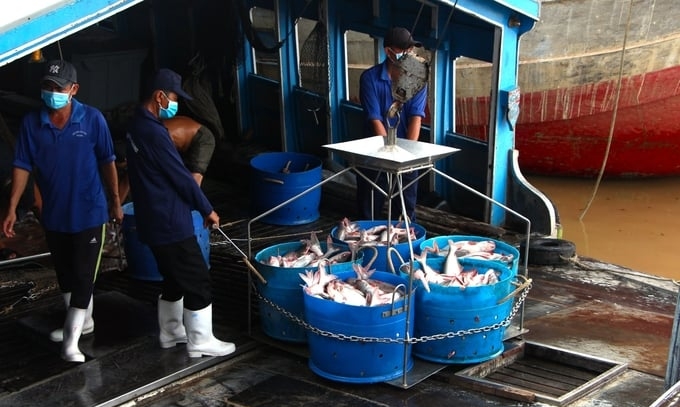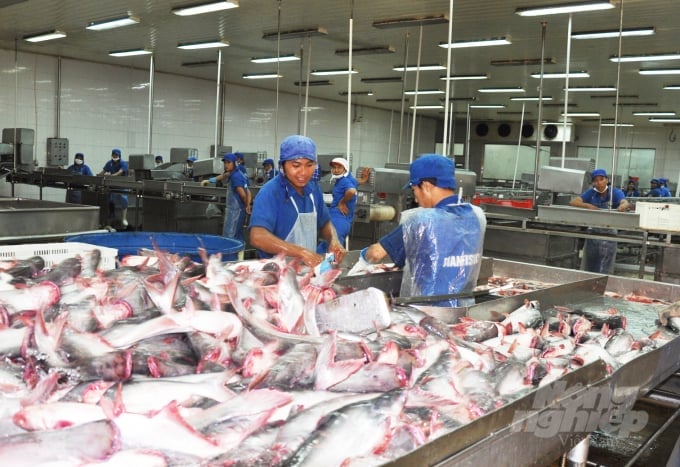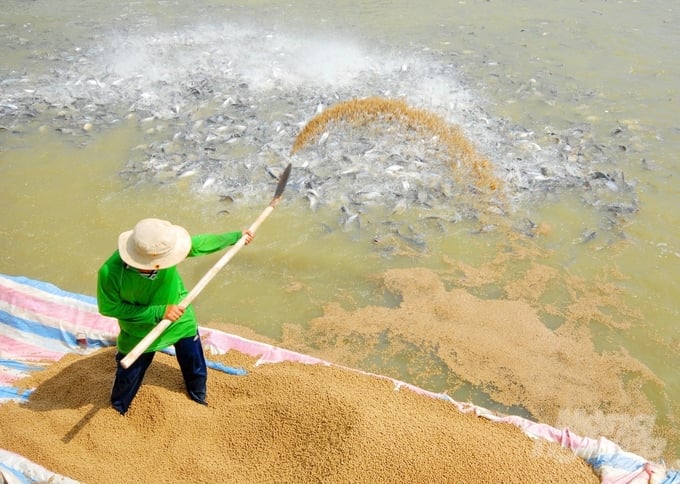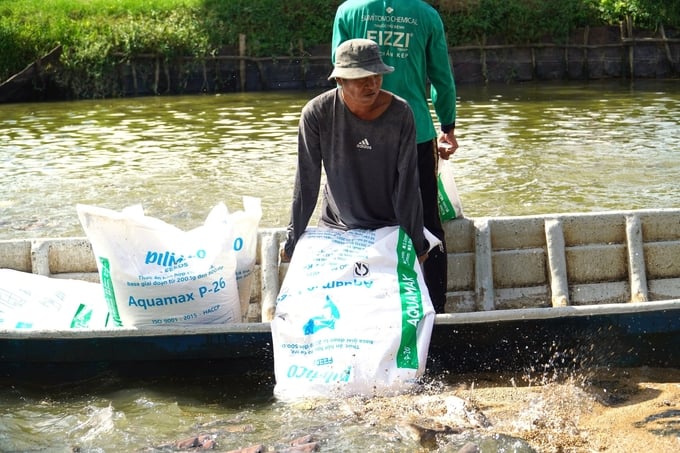June 14, 2025 | 23:19 GMT +7
June 14, 2025 | 23:19 GMT +7
Hotline: 0913.378.918
June 14, 2025 | 23:19 GMT +7
Hotline: 0913.378.918
The fishery processing sector and the pangasius chain have a lot of potential to contribute to production and reduce greenhouse gas emissions in the agricultural sector. Therefore, from the stages of farming, preservation, transportation, processing, and trade, it is necessary to plan for development according to the trend of saving raw materials to achieve the goal of sustainable development.
In the Project on Environmental Protection of the Fisheries Industry for 2021 - 2030, the Department of Fisheries (Ministry of Agriculture and Rural Development) has identified a circular economy as one of the goals the fisheries industry needs to aim for.

The pangasius industry has much potential to contribute to production and reduce greenhouse gas emissions in the agricultural sector. Photo: Kim Anh.
Mr. Tran Dinh Luan, Director of the Department of Fisheries, assessed that promoting circular economic development through public-private cooperation in seafood processing is a good approach because the industry can connect many stakeholders based on capacity and needs, from central and local management agencies to businesses throughout the chain, including scientists and researchers.
Mr. Luan emphasized that each industry and production field must have research to reduce emissions in the current challenging context. Proactively implementing many technological processes, good manufacturing practices, and initiatives will help the industry be proactive when the import market introduces requirements and emission-reduction standards in the upcoming time.
For the pangasius chain, initiating research to assess the current status, analyze challenges, and identify strengths and weaknesses when developing according to the circular economy model is necessary. This is the first step to creating a basis for entities participating in the value chain to propose economical production technology solutions, reduce emissions, and develop sustainably.

Close cooperation between the business sector and state management agencies is required to reduce emissions in the pangasius industry chain. Photo: Kim Anh.
In 2020, the Ministry of Agriculture and Rural Development established the public-private partnership group on fisheries. On that basis, the Department of Fisheries established six sub-groups, including the pangasius industry. The fisheries public-private partnership group operates on the principle of voluntariness and sustainability between the private sector participating in investment, production, business, and providing services in the seafood product chain and the public (state) sector, including relevant state agencies, management organizations, and public service units.
Mr. Nguyen Ba Thong, manager of the Initiative for Sustainable Trade (IDH), said that to promote sustainable pangasius production chains and reduce emissions, it is necessary to provide research, measurement, and evaluation tools and a roadmap for reducing emissions in the chain.
Accordingly, it is necessary to find emission hotspots in the chain to develop practice initiatives to reduce emissions and replicate them for the entire industry. Furthermore, emissions reduction calculations must be done in the whole chain, not just one farm or pond.
The factors causing emissions in the pangasius chain identified by Mr. Thong include feed, input water quality, wastewater sludge, production, processing, preservation, commercial transportation, and loss of products after harvest…

Pangasius food is a factor causing high greenhouse gas emissions. Photo: Kim Anh.
In particular, food is the first factor that causes high greenhouse gas emissions because the food in pangasius farming is mainly from imported raw materials (soybeans, scorn). This raw material is grown on deforested land and has a substantial emission coefficient. Limiting the use of imported feed is an essential factor contributing to reducing emissions in pangasius products.
Mrs. Pham Thi Thu Hong, Deputy General Secretary of the Vietnam Pangasius Association, pointed out that to achieve an average quantity of about 200 tons of pangasius/ha, it is necessary to use a minimum amount of food of 320 tons and the amount of organic matter into the environment about 256 tons. Meanwhile, the country has over 100 pangasius processing facilities with a total design capacity estimated at 1.5 million tons of raw materials/year. However, because fish blood has not been recovered during processing, it has increased pollution, creating a significant environmental challenge.

Food is one of the "hot spot" emissions factors in the pangasius value chain. Photo: Kim Anh.
Accordingly, if Vietnamese businesses have good insect powder production technology, it will help reduce the cost of pangasius production, facilitating traceability of raw materials and reducing emission factors. In addition, it is necessary to utilize by-products from oxidized pangasius fat or sludge at pangasius processing factories to produce biofuel, which will solve the environmental pollution problem and have more revenue.
Black soldier flies have also been included in the list of allowed commercial production by the Ministry of Agriculture and Rural Development. Mr. Thong said this is a potential object that can be used to treat the environment in pangasius production and processing. Black soldier fly larvae are also a potential source of generating large amounts of biomass, a local source of raw materials for aquatic, livestock, and poultry food production.
Currently, food costs in pangasius farming account for 70% - 80% of production costs. Therefore, reducing costs through circular solutions and the reuse of by-products in the pangasius industry's production, processing, and trade chain will improve economic efficiency and reduce emissions.
Translated by Tuan Huy

(VAN) The working delegation from the Ministry of Agriculture and Environment conducted an important trip to the Netherlands to strengthen strategic partnerships and sustainable development in the agricultural sector.

(VAN) The letter ‘A Plea from the Ocean’ not only evokes emotion but also awakens the human conscience to the responsibility of protecting life on Earth.

(VAN) The Department of Agriculture in South Africa has announced the country’s first mass vaccination of poultry to prevent local birds from contracting avian influenza.

(VAN) Establishment of the Mekong Delta Regional Agricultural Linkage Center, aiming for a closed value chain, deep processing, trading platforms, and international market connectivity.

(VAN) Gia Lai province has recently recorded 460 rare species of animals and plants, contributing to forest conservation and biodiversity planning in the region.

(VAN) Ms. Caroline Beresford, New Zealand Ambassador to Vietnam, expressed confidence that agricultural cooperation between Vietnam and New Zealand will develop sustainably, be climate-resilient, and promote gender equality.

(VAN) Vietnam reaffirms its commitment to international cooperation in fostering sustainable and responsible fisheries while ensuring resilient livelihoods for small-scale fishing communities.